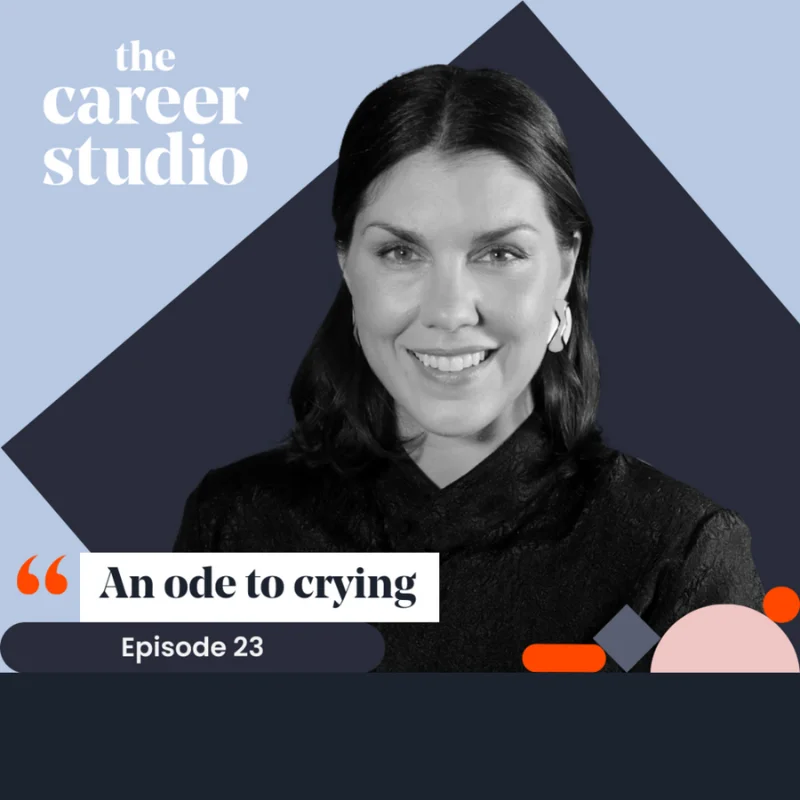An ode to crying

We live in a culture that is embarrassed by tears. So we resist and repress our tears when we feel them triggered. In this episode I dive into why this is a mistake and all the health and growth benefits we get from crying.
In this episode I discuss:
- How our culture shames us into resisting our tears
- The way that tears help us get into alignment
- Tears as a tool to keep our body healthy
- How to approach tears when they come up in a corporate setting
Are you ready to create an energizing career you love?
You can create a career that is simply an extension of who you are and how you want to live your life. If this sounds like what you’re after then schedule a consultation. We'll get to the bottom of what's going on for you. And exactly where you need to focus to bring your career and life into alignment. It's free!
For more from The Career Studio
Transcript
Welcome to the career studio podcast, where we boil down the noise and focus on the core concepts, essential for building an energizing career you love. One that is simply an extension of who you are and how you wanna live your life. Anyone can do it. It's just a matter of knowing what to focus on.
Hello, I wanted to come on today and celebrate crying. I think it's a subject that some people will shy away from. So it'll be interesting to see how many downloads this episode gets. But it's a subject that is very near and dear to my heart that I care a lot about. And I actually wrote the outline to this podcast on a day where I was microdosing.
And when I microdose, I always am a little bit more emotional, more in touch with my feelings. This is one of the great benefits of psychedelics, and so some tears were shed in the making, in the writing of this podcast. So that's very fitting. And the reason I care so much about this topic is that for so much of my life, I really tried to avoid crying.
I had this very, hate- hate relationship with crying. I was super embarrassed if I cried, I felt that I cried too easily and too often and too much. And you know, whenever I felt tears bubble up. If I was in public so socializing or at work or in front of anyone, basically, I would try to push them down, right?
I'd think about something else and, and try to resist the tears. I mean, but even in private, this was a space I didn't like to spend too much time in. You know, a tactic I've often used throughout my life to suppress my emotions would just be like la, la, la, la. Not thinking about it and try and think of something else.
Because you know, I grew up in the same culture that everyone listening to this has grown up in. Tears are not celebrated. In fact, when people see us cry, they think there's something wrong. They get uncomfortable with our tears. Because tears are an expression of emotion. They're an expression of vulnerability, and our society feels very uncomfortable with both of those topics.
You know, people will respond to tears by saying, oh, don't cry, right? Like, as if crying means that something is wrong, and that that situation doesn't warrant crying, and they immediately invalidate your emotional reaction by saying, don't cry. To make themself feel more comfortable or they say, oh my God, are you okay? I'm so sorry. Right? Trying to fix you.
Thinking that they've done something wrong or, or something is wrong for you, that you are crying. Obviously there's an incredibly toxic culture among men where it's not looked well upon for men to cry. It's not masculine for men to cry, which is incredibly disempowering for men.
Suppresses men of this incredible emotional tool that humans have and is really toxic for the culture of masculinity within our society. You know, there's this narrative that being brave, being tough means not crying or crying is weak.
So, yeah, that's what we're facing. That's why there's gonna be people who don't even click on this episode, which I think I'm gonna name an ode to crying or something like that. But the reason I'm recording it because crying is an incredibly important tool, and when we suppress it, or resist it, we lose access to the myriad of benefits.
When I work with my clients, I specifically say to them, I love crying. If you ever feel the need to cry in our sessions, please do that. And these are the reasons why I encourage that, why I believe crying is so incredibly beneficial. It's basically two broad reasons, which I will take you through now.
First, crying tells us what is important to us. When we feel a well of emotion bubbling up inside of us and it's starting to come out of our eyes, it means that we have landed on a topic that is worth exploring, right? It's something that is important to us where there is some sort of emotional reaction, and this means we should stop and reflect and examine what's going on.
We don't wanna rush over our tears. This is something that is obviously very meaningful to us or has a lot of feeling behind. In another way of looking at it, it tells us that things are meaningful or poignant. And not only should we stop and reflect, but we should give that subject the recognition and the space it deserves.
I'll give a personal example for me. At the moment, I'm talking a lot about, maybe not so much on this podcast, but in my social post on LinkedIn, I've talked a lot about my personal growth over the past five or six years and how I haven't had the best time in New York personally for a number of reasons.
It's been five very difficult years of my life. And in the past year, 18 months, I've started to come out of the other side of that, and I'm so grateful. I'm so relieved. I'm so happy to be, kind of in a space of brighter skies and, and more connected to myself and in a space I've wanted to be for so long.
I feel emotional now talking about it. My eyes are actually a little bit moist as I'm talking about it, and so it's, it's the perfect example because at the moment, whenever I talk about this subject, right, I, I, my eyes get moist and I might even cry cuz I talk about it with friends that I meet or my current friends and family, right?
It's been a journey. It's been hard. And the fact that I feel emotional, the fact that I feel tears in my eyes when I talk about it, signifies how important this moment is for me and how it's really worth reflecting on and acknowledging and holding space for personally and not just to rush over it and focus on my new goals and look at the future about everything I'm excited about and what I wanna build, but really reflect on the journey that I've been on, and acknowledge what was hard, what was important to me.
Everything I've done to get where I am today and become the person I am today versus the person I was five or six years ago. So, yeah, that's, that's the first point. Crying is a really good signal to us about what's important to us, what we need to reflect on, what we may need to examine further. When I feel emotional talking about this topic, it's because there's a lot of themes about myself and my own personal journey that I should probably spend some time discussing and I do with my therapist often and my friends.
So yes, crying tells us what's important to us, and obviously knowing what's important to you helps you make decisions that are aligned for you. Helps you recognize what your values are, what your priorities are. So crying is a signal. Stop, reflect, look here, take out some learnings, use them and apply them for your life, or explore this further. Maybe you need to spend some time in this space. Okay, this is the first point.
The second point why crying is so incredibly beneficial is because crying is a release, crying is a healthy way to move through a stressful and overwhelming situation. Okay, so trauma comes from stopping. An emotional response, a neurological emotional response before it's had a chance to complete its cycle through the body.
So when things happen in our life that are unforeseen or upsetting or something happens, we get triggered with an emotional reaction sometimes completely out of our control. Right? We, we can't always, Prevent the emotions that get initiated in our body. And what's essential is that we allow this piercing of emotion.
This, you know, an emotion is a release of, of chemicals in your body. Okay. Your brain thinks something and, and an emotion gets released into your body. And what's important is that you allow those chemicals to be burned up fully and you don't stop the process in your body. Okay? So when we cry, crying allows us to complete the cycle.
It's like a huge emotional release, right? Think about how much lighter you feel after a big cry. You might feel depleted. Crying is like turning on the fire hydrant to your emotions, right? You have all these emotions that have been triggered in your body that are bubbling up and they need to escape. They need release.
But if we suppress our tears, we suppress our emotions, and it's kind of like we're shoving our emotions back into our body, which is the absolute worst place for them to hang out. Okay, and let me just explain to you why it's bad to suppress your emotions. There's a lot of very negative impacts on our life, physically and emotionally and mentally by suppressing our feelings.
And I talk about this more in the episode about feelings you're overlooked superpower. Okay? But it's worth reiterating here again. Okay? So there's a lot of research that suppressed emotions cause physical issues in your body. Could be back pain, headaches, migraine, chronic back pain. There's an excellent book called: Healing Back Pain, I've mentioned before by a NYU doctor. Whose entire clinic was based on the premise that chronic back pain is caused by suppressed anger and anxiety, basically suppressed emotions. And he had thousands and thousands of patients who successfully went through his program and healed their chronic back pain by addressing their emotional needs.
Okay? So when we repress our emotions, they don't disappear. They go hang out in the body and they cause havoc. Okay. Digestion issues as well. Ulcers, right? It's very commonly known that ulcers are caused by stress, right? And if you address the stress, you fix the ulcer. Until we knew that there was tons of like medicine for ulcers, and now doctors just say that you're stressed and you have to stop being stressed.
You're gonna have to put yourself in a different environment where you're not stressed and therefore you won't have the ulcer. So that's problem one, that comes from suppressing our emotions. Problem two, from suppressing our emotions. When we suppress our emotions, they're still hanging out. We haven't gotten rid of them. They are still in our body.
And so these emotions, they've been triggered, but they haven't burnt up fully. So they're like these embers, these smoldering embers that we're pushing into our body. Okay. And the problem with that is one smoldering ember uses energy, right? Because it's still smoldering. And two, what are embers great for? They are great for lighting a fire quickly.
So if you have a bunch of smoldering embers in your body and you have a new piece of fuel that comes from your external environment that triggers the embers, you might explode in an emotional reaction that you would prefer not to have had. Okay, but it's because you have been suppressing and suppressing a feeling, right?
Let's say someone is annoying you and you don't talk about it, and you don't examine it, and you just keep suppressing your frustration, keep suppressing your frustration, and then finally they say something and you just blow up at them, okay? That's because you have not processed your feelings about the situation.
You have not addressed them, and now you've blown up with this person, which is probably not what you wanted to do. Okay. This is what I mean. When we suppress our emotions, they don't go away. They hang out in the body. They cause physical pain or they hang out just waiting to be reignited. Okay? Then the third negative reaction of suppressing our emotions is a buffering reaction.
So when we suppress our emotions, we don't wanna feel them and to not feel them we will do another activity that gives us a reliable hit of dopamine that kind of masks the uncomfortable emotion we're trying to suppress. Right? So this is like, we can buffer an emotion and an uncomfortable emotion with more work.
By eating, by drinking, by taking drugs, by socializing, by watching Netflix. All of these activities are things that we turn to scrolling social media, right? These are all things we turn to when we don't wanna feel uncomfortable feelings, okay? So we're masking our emotions. All right? So all of this can be avoided.
If instead of suppressing your tears, you just allow your tears to come, allow your tears to come so that you can feel your uncomfortable emotion for a couple minutes. Cry and release it out of your body. Okay? Then it's no longer hanging out in your body and you are not doing something to cover it up.
I really consider crying like sleep, right? Sleep is one of these magical things that if we prioritize it has countless benefits to our overall health. And crying is the same, right? It, it's, it's the fastest way to process our emotions. It moves them out of our body, through our body. So it's like a refresh. It's like cleaning out the system so it doesn't get moldy or backed up. Emotions need to flow through the body and out the body. And when they get stuck in the body, we have problems. So crying allows them to flow out of the body.
Think of your tears as literally the expulsion of emotions out of your body. So these days I really try and let the tears come whenever they arise. Sometimes I'll be home thinking about something and I'll feel emotional and I'll, I'll shed some tears, but it'll be like, I'll cry for like five seconds, you know, it'll be like 10 tears that come out of my eyes, or it's just like a little, a little emotional release or, or maybe I'll be having, um, a conversation with someone.
And like I was kind of saying at the start, I'll suddenly feel myself, my eyes getting moist. I'll feel some emotion swelling in my body. And what I do now is I say, it's actually making me quite emotional to say this. I just call it out. And this almost gives me permission to have moist eyes to cry, so I'm not like fighting against myself to not show emotion to this person.
I'm verbally giving myself permission and kind of setting the stage for them that I am comfortable with my own emotion, right? Which will then make them more comfortable as well, right? So they don't say, oh my God, are you okay? Don't cry. I'm saying, I'm actually feeling quite emotional talking about it. I'm actually, my eyes are actually, I'm feeling a bit teary talking about it, right? And, and this kind of creates a safe space for me to show emotion. And I do the same thing with my clients. I've had moments in my coaching calls where they've said something that has moved me, or I've been explaining something that I've felt very emotionally charged by. And I say the same thing.
And you know, actually, I've found that this helps bond me to other people, right? Because crying is vulnerable. And even though I think it should be less taboo, it is a bit taboo. And so when you're vulnerable in front of someone else, this is going to build trust, okay? And trust is the foundation of great relationships.
So if you wanna bond with someone quickly, shed a tear or two in front of them, it's okay. And you know, it's actually a bit counterintuitive, but now that I have opened myself up, to crying more, and, and just being okay with the expression of emotion through tears, I actually cry less than I did because I have like less pent up emotion that hasn't been processed.
So while I might shed some tears and my eyes might get moist, it's just less overwhelming. It's like this less of a floodgate coming out. There's actually an anecdote maybe I'll share now, where when I used to work in advertising and I'd get my performance reviews, I would even cry, like oftentimes, and I say this, I try and say this with humility.
Oftentimes those reviews would be, you're doing great work, right? Like, you're really well suited to this job and you're doing great work. And I was so overwhelmed with that positive feedback. Which is another topic I guess. I wasn't used to hearing a lot of positive feedback, but I was so overwhelmed with the positive feedback that I would cry.
I would literally sob like it's like this huge flood of emotion, again, because I felt no feelings and, and so just feeling something that was positive and that produced an emotional reaction in me that was fairly strong. I was so overcome with emotion that I would sob. In these very positive performance reviews, which I was a bit embarrassed by, but it's because I wasn't processing my feelings.
And so I had all of this emotion pent up. And so again, it was triggered, right? I had something in my environment that emotionally triggered me, and I had this huge overreaction. What could have happened? I had moist eyes, maybe a little tear or two, but because I never felt any feelings, I never allowed myself to cry. It was just like the floodgates opened.
And actually, I think it's worth maybe just addressing quickly here, my thoughts on crying in a professional setting because they're twofold. Like first, if you are lucky enough to work in an environment where you trust your manager and your team and you generally feel safe with them and they are an emotionally mature person, then it is okay to shed some tears and it's okay to show emotion through tears. Right. An emotionally mature person will understand that will support you. We'll help you address whatever needs to be addressed. It's not gonna be considered a sign of weakness, and it's okay.
However, if you are in a toxic environment with people who are not emotionally mature, and therefore you do not feel safe to show tears or show emotion. What I wanna strongly suggest is that you do whatever it takes to not suppress your emotion, but you need to do that in a way that works within that environment. So what I would recommend is if you are feeling emotional, if you're feeling like you want to cry, you need to cry, that you create the space to allow yourself to do that, right?
You don't wanna suppress your tears as much as possible, you need to create a moment for you to release whatever emotion is coming up for you. So if you need to excuse yourself and go on a walk or find a private place within the workplace to shed the tears so that you can process your emotion, that is what my strong recommendation is.
Find a safe place to do that so you can release. And once you release, you're going to come back to center. You're gonna be much more stable, and that's gonna allow you to have a more productive conversation within that toxic environment, right? When we don't process our feelings and we bottle them we are less connected to ourselves, we're less grounded, and it's harder for us to navigate whatever the situation is in a way that we want to, right?
If you're suppressing, you're suppressing, you're suppressing, because you are in this environment where you don't feel safe to cry, you might end up reacting in a way that you don't wanna react, right? You might burst into tears, even if you don't want to because you've been suppressing, suppressing, suppressing.
So that's my recommendation on crying in a professional setting. And this is basically the episode. Let the tears bubble up. Let the emotion flow. Allow your eyes to get moist during a conversation. Tell people that you know that that's happening and it's okay. And if you need to excuse yourself to cry, go do that.
But let the tears come. Human beings are designed to cry. Crying is a tool nature has given us to process our emotions. So connect to your own humanity. Give your body the release it needs. Using the system of releasing it. Designed crying is a wonderful tool to keep you healthy, tell you what's important, and bond you to others. So use it and have a great week.
Hey, if you're ready to create an energizing career you love, one that is simply an extension of who you are and how you want to live your life. Then I wanna invite you to schedule a consultation. We'll get to the bottom of what's going on for you. And exactly where you need to focus to bring your career and life into alignment. It's free. Just head on over to thecareer.studio/schedule to find a time that works for you, or if you're enjoying and getting value from these episodes, I'd love you to leave a short review on whatever podcast app you use.
This helps other people like you find and get value from the podcast too.



